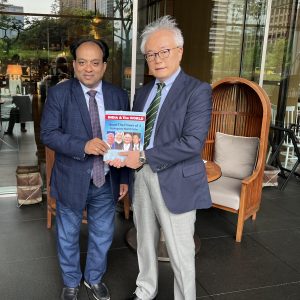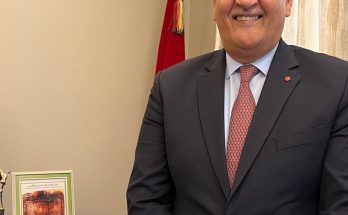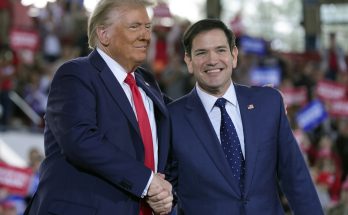
TOKYO: The second in-person Quad summit held in Tokyo on May 24 cemented solidarity among four major liberal democracies and strengthened their cooperation to deal with emerging challenges to the rules-based order. The summit in Tokyo has shown that Quad is here to stay, says Tomohiko Taniguchi, Special Advisor to the Cabinet of then Prime Minister Shinzo Abe. In this interview with Manish Chand, CEO & Editor-in-Chief, India Writes Network and India and The World, in Tokyo, Prof. Taniguchi underlined the pivotal role of India and Prime Minister Narendra Modi in shaping Quad as a powerful force of regional stability. Prof. Taniguchi, a leading foreign policy commentator and Professor, Graduate School of SDM, Keio University, also speaks about the Quad’s strategy for dealing with the China challenge.
(Excerpts from the interview)
Q) What was the big takeaway from the Quad summit in Tokyo? Do you think the Quad summit has restored the focus back on the Indo-Pacific, which suffered in the wake of the pandemic?
A) This summit has been very significant. First, because it took place right in the middle of the bloody war raging in Europe when the United States was forced to pay much more attention to the European front than to the Indo-Pacific. Notwithstanding, President Biden chose to bring his frail body somehow to Seoul and Tokyo to showcase to the rest of the world and to the domestic audiences that here in this part of the world and the Indo-Pacific, you get future opportunities and future challenges. Therefore, there will continue to be a need for the United States to concentrate its attentions and assets not on Europe, but more on Indo-Pacific. This was a powerful message to the region.
About Japan, Prime Minister Fumio Kishida was largely dubbed as dovish, compared to his predecessor, especially Shinzo Abe, who actually designed Quad. Still, he succeeded in making a pledge to the international community using the next five years as a window of opportunity. The Japanese government is going to incrementally increase its defence budget to make it finally on par with European NATO member nations. Third, about Australia. Scott Morrison was one of the founders of Quad. There was a degree of uncertainty, especially because the new prime minister was sworn in only one day prior to the Quad meeting. So once again, it showed the Quad is here to stay. And I think that was a powerful demonstration of the longevity of Quad. Overall, Quad has succeeded in strengthening its image overriding some of the changes of the government, and some of the changes in the international environment.
Q) How do you look at the role of India in strengthening Quad?

A) Without India, without Narendra Modi, Quad could not have flown. There was a degree of hesitancy among the elite community members of Delhi, about India joining largely US-led camp. It took the courage and straightforwardness of Narendra Modi to have overcome the legacy of non-alignment.
Furthermore, since the war erupted in Ukraine, India led by Narendra Modi showed its less determined posture of helping Ukraine and it struggled, it seems to me and to many others, to find a balance between Russia and Ukraine. But when it comes to the Indo- Pacific theatre, he is well aware that the immediate challenge may be about Russia-Ukraine war, but the long term challenge will continue to be in the Indo-Pacific region.
The reason why Shinzo Abe expanded the geographic horizon from Asia-Pacific to Indo-Pacific was primarily because he wanted to include India, being aware that the Indian Ocean would be the industrial highway for the 21st century. And given the fact that if there is any country in the world that feels very much responsible of the peace and safety and prosperity in the Indian Ocean region, it is India – which is the reason why Shinzo Abe spoke of the “Confluence of the Two Seas” back in 2007, and expanded the geographic concept of Asia-Pacific to Indo-Pacific. Narendra Modi is fully aware of that conception, and has demonstrated vividly to the rest of the Quad member nations that India is very much a responsible partner of the Quad arrangement.
Q) Before the summit, there was a lot of talk about Ukraine as a potentially divisive issue, and India was sought to be portrayed as an outlier by some critics. Do you think the Tokyo summit found a balance on this issue?
A) You could not possibly alienate India. That’s going to do harm to the Quad. The relationship that India has with Russia is a friendship of convenience, not of heart. And since 1962, there has been actually no option other than India relying upon some of the material that came from Russia, Soviet Russia at the time. So, it’s been an institutionalized legacy.
Indian opinion-makers should come out and tell to the Japanese, Australians, Americans that basically without the supplies and components that India continues to buy from Russia, you couldn’t feed, you couldn’t maintain the Indian Army where its number one threat comes from over Himalayas, from China. On the whole, leaders of Quad countries have made a wise decision, demonstrating again to the world that Quad is about the future. And there is no point to be made by pushing India further to the other end.
Q) Like before, there is no explicit mention of China in the joint statement. But many of the new initiatives that emerged from this Tokyo Summit, are clearly targeted at China, in a direct or an indirect way. Do you think Quad has strengthened its capacity and coordination to deal with the China challenge?
A) Not yet. Not yet. Especially when you look at the plan that Xi Jinping is after, it is there, it is enshrined, engraved into stone that China must take Taiwan back. No longer it is a question of whether or not, it is a question of how soon. And you have got to look at the timeline. This winter, this autumn, Xi Jinping is likely to be elected third time; five years after this year, he is going to face another contest. And some people would say he will have become too aged to pursue another term in 2027. So, the next five year period is going to be the most important, and probably the last open window for Xi Jinping to complete his China dream by taking Taiwan in. There could be hundreds of different ways. It does not necessarily mean that the Chinese military is going to have to be activated; there will be much, much more creative means with which China could rock the boat of Taiwan, engineer societal unrest and invite calls from Taiwanese leaders to the Chinese to get involved. Those are the creative means Xi Jinping is thinking about.
But who could check China from activating those scenarios? Would Europe come to join forces? I doubt. Should Australia be involved? Well, I can say, I cannot say for sure. And I do not think the Indian Army is going to get involved in the theatre. So, it comes down to only two nations, namely the United States and Japan. Quad countries must always stick together and continue to say to the Chinese, we’re here, we’re not going to go anywhere.
Q) At the Tokyo summit, the Quad partners have pledged $50 billion plus for sustainable and transparent infrastructure building. Do you think this Quad infrastructure partnership will be strong enough to pose an alternative to China-led BRI?
A) I think it’s already effective. When there was a gathering of G7 leaders back in 2016 in Japan, Shinzo Abe first proposed quality infrastructure. Quality infrastructure indicated that the infrastructure that the Chinese were building was not quality infrastructure. Now, look at Sri Lanka, and look at what’s happened in many other African nations.
As far as the Belt and Road Initiative is concerned, there is now much less talk; few Chinese leaders talk anymore about Belt and Road initiative. Where has BRI gone? Now, there is actually less need for the democratic nations to counterbalance the Belt and Road Initiative.
Nonetheless, I think India, Japan, Australia, United States continue to have to show to countries such as Uganda and the Maldives that we’re here to help build ports, dams and electricity power plants and with government-sponsored relatively affordable loans. In the long term, this is going to help support your own infrastructure building. The thing is, we cannot give bribes to leaders in some of those countries. So, if you wish to get bribe, go to the Chinese. So, it’s once again to show to the world that who should be trusted.

Author Profile

- Manish Chand is Founder-CEO and Editor-in-Chief of India Writes Network (www.indiawrites.org) and India and World, a pioneering magazine focused on international affairs. He is CEO/Director of TGII Media Private Limited, an India-based media, publishing, research and consultancy company.
Latest entries
 India and the WorldJune 16, 2025Amid Pakistan-Turkey nexus, Cyprus joins India against cross-border terror
India and the WorldJune 16, 2025Amid Pakistan-Turkey nexus, Cyprus joins India against cross-border terror India and the WorldMay 8, 2025Pahalgam payback: India exposes Pakistan’s lies, misuse of religious sites for training terrorists
India and the WorldMay 8, 2025Pahalgam payback: India exposes Pakistan’s lies, misuse of religious sites for training terrorists India and the WorldMay 3, 2025IMEEC provides a democratic alternative to BRI: Italy’s former foreign minister (Interview)
India and the WorldMay 3, 2025IMEEC provides a democratic alternative to BRI: Italy’s former foreign minister (Interview) India and the WorldApril 21, 20253T Template for India-US Mega Partnership
India and the WorldApril 21, 20253T Template for India-US Mega Partnership







